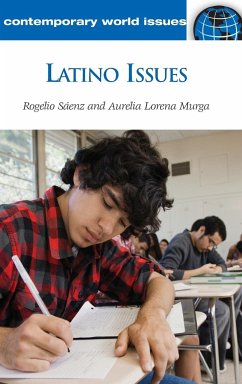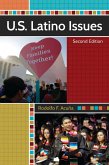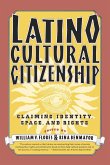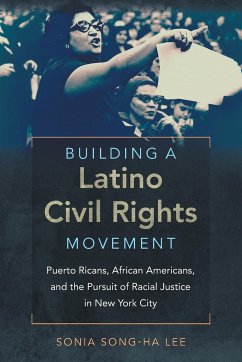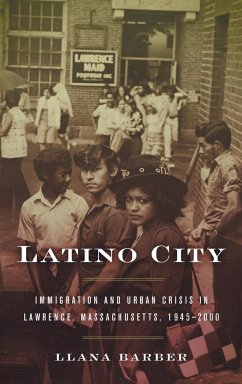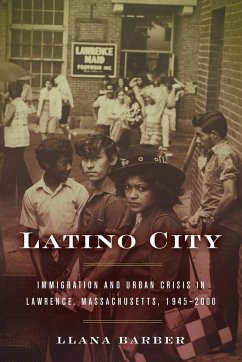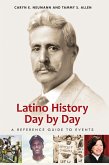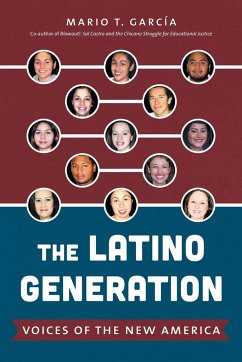- Gebundenes Buch
- Merkliste
- Auf die Merkliste
- Bewerten Bewerten
- Teilen
- Produkt teilen
- Produkterinnerung
- Produkterinnerung
This book provides a lively understanding of the growing Latina/o population in the United States, highlights the problems that confront this ethnic group, and discusses proposed solutions to these issues. The groups that comprise the Latina/o population differ with respect to histories, length of residence in the United States, mode in which they originally came to this country, and trajectory of integration. Latinos in America: A Reference Handbook provides a comprehensive overview of Latina/o experiences in the United States from historical and contemporary perspectives, illustrating the…mehr
Andere Kunden interessierten sich auch für
![U.S. Latino Issues U.S. Latino Issues]() Rodolfo AcuñaU.S. Latino Issues80,99 €
Rodolfo AcuñaU.S. Latino Issues80,99 €![Latino Cultural Citizenship Latino Cultural Citizenship]() William FloresLatino Cultural Citizenship25,99 €
William FloresLatino Cultural Citizenship25,99 €![Building a Latino Civil Rights Movement Building a Latino Civil Rights Movement]() Sonia Song-Ha LeeBuilding a Latino Civil Rights Movement47,99 €
Sonia Song-Ha LeeBuilding a Latino Civil Rights Movement47,99 €![Latino City Latino City]() Llana BarberLatino City108,99 €
Llana BarberLatino City108,99 €![Latino City Latino City]() Llana BarberLatino City47,99 €
Llana BarberLatino City47,99 €![Latino History Day by Day Latino History Day by Day]() Caryn NeumannLatino History Day by Day113,99 €
Caryn NeumannLatino History Day by Day113,99 €![The Latino Generation The Latino Generation]() Mario T. GarcíaThe Latino Generation36,99 €
Mario T. GarcíaThe Latino Generation36,99 €-
-
-
This book provides a lively understanding of the growing Latina/o population in the United States, highlights the problems that confront this ethnic group, and discusses proposed solutions to these issues. The groups that comprise the Latina/o population differ with respect to histories, length of residence in the United States, mode in which they originally came to this country, and trajectory of integration. Latinos in America: A Reference Handbook provides a comprehensive overview of Latina/o experiences in the United States from historical and contemporary perspectives, illustrating the diversity of this disparate population. The handbook covers numerous aspects of Latino life in the United States, engaging readers in current problems and controversies involving the Latino population and suggesting solutions. Profiles of prominent Latina/os are included, as is information on legal/illegal immigration, bilingual education, affirmative action, dual citizenship, and assimilation-all of which will prove invaluable to students, as well as to policymakers, educators, and other community leaders interested in improving the lives of Latinos within our borders.
Hinweis: Dieser Artikel kann nur an eine deutsche Lieferadresse ausgeliefert werden.
Hinweis: Dieser Artikel kann nur an eine deutsche Lieferadresse ausgeliefert werden.
Produktdetails
- Produktdetails
- Verlag: ABC-CLIO
- Seitenzahl: 304
- Erscheinungstermin: 16. Juni 2011
- Englisch
- Abmessung: 235mm x 157mm x 21mm
- Gewicht: 596g
- ISBN-13: 9781598843149
- ISBN-10: 1598843141
- Artikelnr.: 29954421
- Herstellerkennzeichnung
- Books on Demand GmbH
- In de Tarpen 42
- 22848 Norderstedt
- info@bod.de
- 040 53433511
- Verlag: ABC-CLIO
- Seitenzahl: 304
- Erscheinungstermin: 16. Juni 2011
- Englisch
- Abmessung: 235mm x 157mm x 21mm
- Gewicht: 596g
- ISBN-13: 9781598843149
- ISBN-10: 1598843141
- Artikelnr.: 29954421
- Herstellerkennzeichnung
- Books on Demand GmbH
- In de Tarpen 42
- 22848 Norderstedt
- info@bod.de
- 040 53433511
Rogelio Sáenz, Aurelia Lorena Murga
Preface
1 Introduction
Manifest Destiny
Context of Reception
Manifest Destiny
Conquest and Colonization
Annexation and War
Annexation
Mexican-American War
Spanish-American War
Political Turmoil: Central and South Americans
Nicaragua
El Salvador
Guatemala
Colombia
Continued Struggles for Inclusion
Pan-Ethnicity
Conclusion
References
2 Problems
Controversies
and Solutions
The Context
Immigration
Latina/os as the Engine of U.S. Population Growth
The Reactions from Various Sectors of U.S. Society
Problems and Controversies Facing Latina/os
The Perception of Latina/os as Outsiders
Major Issue One: Immigration Reform
Mixed-Status and Transnational Families
Climate of Fear
Major Issue Two: Education
The Loss of Human Capital: The Case of Undocumented Students
Solutions
To Be Defined as a Problem
Possible Solutions
Conclusion
References
3 Worldwide Perspective
The Conception of Race in Latin America
The Social Construction of Race in Latin America
Myth of a Racial Democracy
Enumerating Race in Latin America
Selected Destination Countries Outside of the United States and Latin America
Spain
Why Spain?
Images of Immigrants
Immigration Policy
Recent Developments
Canada
Canada's Guest Worker Program and Latin American Immigration
Profile of Latin Americans in Canada
The Latin American Experience in Canada
Recent Developments
Japan
Historical Context for the Immigration of Asians to Latin America
The Internment Experience of Japanese in Latin America
Post-World War II Movement of Japanese to Latin America
Changing Demography in Japan and Latin American Immigration to Japan
Recent Developments
Conclusion
References
4 Chronology
5 Biographical Sketches
Isabel Allende (August 2
1942)
Rudolfo Anaya (October 30
1937)
Gloria Anzaldúa (September 26
1942-May 15
2004)
Rubén Blades (July 16
1948)
Henry Bonilla (January 2
1954)
César Chávez (March 31
1927-April 23
1993)
Linda Chavez (June 17
1947)
Henry Cisneros (June 11
1947)
Sandra Cisneros (December 20
1954)
Roberto Clemente (August 18
1934-December 31
1972)
Willie Colón (April 28
1950)
Gloria Estefan (September 1
1957)
Ernesto Galarza (August 15
1905-June 22
1984)
Alberto Gonzales (August 4
1955)
José Angel Gutiérrez (October 25
1944)
Dolores Huerta (April 10
1930)
Rosario Marin (April 4
1958)
Mel Martinez (October 23
1946)
Rita Moreno (December 11
1931)
Antonia C. Novello (August 23
1944)
Edward James Olmos (February 24
1947)
Miguel Piñero (December 19
1946-June 18
1988)
Alejandro Portes (October 13
1944)
Bill Richardson (November 15
1947)
Ileana Ros-Lehtinen (July 15
1952)
Julian Samora (March 1
1920-February 2
1996)
José Serrano (October 24
1943)
Marta Tienda (August 10
1950)
Willie Velásquez (May 9
1944-June 15
1988)
Raul Yzaguirre (July 22
1939)
6 Data and Documents
Documents
The Making of Latina/os in the United States
The Treaty of Guadalupe Hidalgo and Mexican Americans
The Treaty of Paris of 1898 and Cubans and Puerto Ricans
The Platt Amendment and the Intervention of the United States in the Affairs of Cuba
The Jones Act of 1917 and the Granting of U.S. Citizenship to Puerto Ricans
Citizenship and Race
Racial Ambiguity of Mexicans and Latina/os in the U.S. Census in the Early 20th Century
The Mexican Repatriation Program
World War II
The Bracero Program: 1942-1964
World War II and the Advent of Latino War Heroes
The Era of the Seeds for Social Change: Late 1940s to Early 1960s
The Felix Longoria Incident
Hernandez v. State of Texas
Cuban Immigration to the United States
The Era of Confrontational Politics and Nationalism: Late 1960s to Late 1970s
Immigration and the Changing Latina/o Population: Post-1965
Data
Census Data
Pew Hispanic Center
Mexican Migration Project and Latin American Migration Project
Conclusion
References
7 Directory of Organizations
American Association of Hispanics in Higher Education
Inc.
American GI Forum of the United States
ASPIRA Association
Inc.
Association of Hispanic Arts
Cesar E. Chavez Foundation
Congressional Hispanic Caucus
Congressional Hispanic Caucus Institute
Congressional Hispanic Conference
Cuban American National Council
Cuban American National Foundation
Dominican American National Roundtable
Hispanas Organized for Political Equality
Hispanic Association of Colleges and Universities
Hispanic Elected Local Officials
Hispanic Genealogy Society of New York
Hispanic Scholarship Fund
Hispanics Inspiring Students' Performance and Achievement
Inter-University Program for Latino Research
Julian Samora Research Institute
La Raza Unida Party
Labor Council for Latin American Advancement
Latin American Studies Association
Latino Justice Puerto Rican Legal Defense and Educational Fund
League of United Latin American Citizens
MANA
A National Latina Organization
Mexican American Legal Defense and Educational Fund
National Alliance for Hispanic Health
National Association for Chicana and Chicano Studies
National Association of Latino Elected and Appointed Officials
National Association of Latino Elected and Appointed Officials Educational Fund
National Community for Latino Leadership
National Council of La Raza
National Hispanic Caucus of State Legislators
National Puerto Rican Coalition
Inc.
Pew Hispanic Center
Smithsonian Latino Center
United Farm Workers of America
University of California
Los Angeles Chicano Studies Research Center
Willie C. Velasquez Institute
8 Resources
Printed Resources
Latina/os
History
Race and Ethnicity/Identity
Demography
Gender
Education
Politics
Women Labor
Criminal Justice and Law
Immigration
Transnational Movement
Health
Family
Religion
Mass Media/Discourse
Journalism
Literature and Memoirs
Poetry
Journals
Paper Collection
Nonprint Resources
Television Special Report
Documentaries
Magazines Online
News Online
Radio News Show
Museums Online
Research Resources Online
Oral Histories
Other Useful Links
Audiovisual Clips
Glossary
Index
About the Authors
1 Introduction
Manifest Destiny
Context of Reception
Manifest Destiny
Conquest and Colonization
Annexation and War
Annexation
Mexican-American War
Spanish-American War
Political Turmoil: Central and South Americans
Nicaragua
El Salvador
Guatemala
Colombia
Continued Struggles for Inclusion
Pan-Ethnicity
Conclusion
References
2 Problems
Controversies
and Solutions
The Context
Immigration
Latina/os as the Engine of U.S. Population Growth
The Reactions from Various Sectors of U.S. Society
Problems and Controversies Facing Latina/os
The Perception of Latina/os as Outsiders
Major Issue One: Immigration Reform
Mixed-Status and Transnational Families
Climate of Fear
Major Issue Two: Education
The Loss of Human Capital: The Case of Undocumented Students
Solutions
To Be Defined as a Problem
Possible Solutions
Conclusion
References
3 Worldwide Perspective
The Conception of Race in Latin America
The Social Construction of Race in Latin America
Myth of a Racial Democracy
Enumerating Race in Latin America
Selected Destination Countries Outside of the United States and Latin America
Spain
Why Spain?
Images of Immigrants
Immigration Policy
Recent Developments
Canada
Canada's Guest Worker Program and Latin American Immigration
Profile of Latin Americans in Canada
The Latin American Experience in Canada
Recent Developments
Japan
Historical Context for the Immigration of Asians to Latin America
The Internment Experience of Japanese in Latin America
Post-World War II Movement of Japanese to Latin America
Changing Demography in Japan and Latin American Immigration to Japan
Recent Developments
Conclusion
References
4 Chronology
5 Biographical Sketches
Isabel Allende (August 2
1942)
Rudolfo Anaya (October 30
1937)
Gloria Anzaldúa (September 26
1942-May 15
2004)
Rubén Blades (July 16
1948)
Henry Bonilla (January 2
1954)
César Chávez (March 31
1927-April 23
1993)
Linda Chavez (June 17
1947)
Henry Cisneros (June 11
1947)
Sandra Cisneros (December 20
1954)
Roberto Clemente (August 18
1934-December 31
1972)
Willie Colón (April 28
1950)
Gloria Estefan (September 1
1957)
Ernesto Galarza (August 15
1905-June 22
1984)
Alberto Gonzales (August 4
1955)
José Angel Gutiérrez (October 25
1944)
Dolores Huerta (April 10
1930)
Rosario Marin (April 4
1958)
Mel Martinez (October 23
1946)
Rita Moreno (December 11
1931)
Antonia C. Novello (August 23
1944)
Edward James Olmos (February 24
1947)
Miguel Piñero (December 19
1946-June 18
1988)
Alejandro Portes (October 13
1944)
Bill Richardson (November 15
1947)
Ileana Ros-Lehtinen (July 15
1952)
Julian Samora (March 1
1920-February 2
1996)
José Serrano (October 24
1943)
Marta Tienda (August 10
1950)
Willie Velásquez (May 9
1944-June 15
1988)
Raul Yzaguirre (July 22
1939)
6 Data and Documents
Documents
The Making of Latina/os in the United States
The Treaty of Guadalupe Hidalgo and Mexican Americans
The Treaty of Paris of 1898 and Cubans and Puerto Ricans
The Platt Amendment and the Intervention of the United States in the Affairs of Cuba
The Jones Act of 1917 and the Granting of U.S. Citizenship to Puerto Ricans
Citizenship and Race
Racial Ambiguity of Mexicans and Latina/os in the U.S. Census in the Early 20th Century
The Mexican Repatriation Program
World War II
The Bracero Program: 1942-1964
World War II and the Advent of Latino War Heroes
The Era of the Seeds for Social Change: Late 1940s to Early 1960s
The Felix Longoria Incident
Hernandez v. State of Texas
Cuban Immigration to the United States
The Era of Confrontational Politics and Nationalism: Late 1960s to Late 1970s
Immigration and the Changing Latina/o Population: Post-1965
Data
Census Data
Pew Hispanic Center
Mexican Migration Project and Latin American Migration Project
Conclusion
References
7 Directory of Organizations
American Association of Hispanics in Higher Education
Inc.
American GI Forum of the United States
ASPIRA Association
Inc.
Association of Hispanic Arts
Cesar E. Chavez Foundation
Congressional Hispanic Caucus
Congressional Hispanic Caucus Institute
Congressional Hispanic Conference
Cuban American National Council
Cuban American National Foundation
Dominican American National Roundtable
Hispanas Organized for Political Equality
Hispanic Association of Colleges and Universities
Hispanic Elected Local Officials
Hispanic Genealogy Society of New York
Hispanic Scholarship Fund
Hispanics Inspiring Students' Performance and Achievement
Inter-University Program for Latino Research
Julian Samora Research Institute
La Raza Unida Party
Labor Council for Latin American Advancement
Latin American Studies Association
Latino Justice Puerto Rican Legal Defense and Educational Fund
League of United Latin American Citizens
MANA
A National Latina Organization
Mexican American Legal Defense and Educational Fund
National Alliance for Hispanic Health
National Association for Chicana and Chicano Studies
National Association of Latino Elected and Appointed Officials
National Association of Latino Elected and Appointed Officials Educational Fund
National Community for Latino Leadership
National Council of La Raza
National Hispanic Caucus of State Legislators
National Puerto Rican Coalition
Inc.
Pew Hispanic Center
Smithsonian Latino Center
United Farm Workers of America
University of California
Los Angeles Chicano Studies Research Center
Willie C. Velasquez Institute
8 Resources
Printed Resources
Latina/os
History
Race and Ethnicity/Identity
Demography
Gender
Education
Politics
Women Labor
Criminal Justice and Law
Immigration
Transnational Movement
Health
Family
Religion
Mass Media/Discourse
Journalism
Literature and Memoirs
Poetry
Journals
Paper Collection
Nonprint Resources
Television Special Report
Documentaries
Magazines Online
News Online
Radio News Show
Museums Online
Research Resources Online
Oral Histories
Other Useful Links
Audiovisual Clips
Glossary
Index
About the Authors
Preface
1 Introduction
Manifest Destiny
Context of Reception
Manifest Destiny
Conquest and Colonization
Annexation and War
Annexation
Mexican-American War
Spanish-American War
Political Turmoil: Central and South Americans
Nicaragua
El Salvador
Guatemala
Colombia
Continued Struggles for Inclusion
Pan-Ethnicity
Conclusion
References
2 Problems
Controversies
and Solutions
The Context
Immigration
Latina/os as the Engine of U.S. Population Growth
The Reactions from Various Sectors of U.S. Society
Problems and Controversies Facing Latina/os
The Perception of Latina/os as Outsiders
Major Issue One: Immigration Reform
Mixed-Status and Transnational Families
Climate of Fear
Major Issue Two: Education
The Loss of Human Capital: The Case of Undocumented Students
Solutions
To Be Defined as a Problem
Possible Solutions
Conclusion
References
3 Worldwide Perspective
The Conception of Race in Latin America
The Social Construction of Race in Latin America
Myth of a Racial Democracy
Enumerating Race in Latin America
Selected Destination Countries Outside of the United States and Latin America
Spain
Why Spain?
Images of Immigrants
Immigration Policy
Recent Developments
Canada
Canada's Guest Worker Program and Latin American Immigration
Profile of Latin Americans in Canada
The Latin American Experience in Canada
Recent Developments
Japan
Historical Context for the Immigration of Asians to Latin America
The Internment Experience of Japanese in Latin America
Post-World War II Movement of Japanese to Latin America
Changing Demography in Japan and Latin American Immigration to Japan
Recent Developments
Conclusion
References
4 Chronology
5 Biographical Sketches
Isabel Allende (August 2
1942)
Rudolfo Anaya (October 30
1937)
Gloria Anzaldúa (September 26
1942-May 15
2004)
Rubén Blades (July 16
1948)
Henry Bonilla (January 2
1954)
César Chávez (March 31
1927-April 23
1993)
Linda Chavez (June 17
1947)
Henry Cisneros (June 11
1947)
Sandra Cisneros (December 20
1954)
Roberto Clemente (August 18
1934-December 31
1972)
Willie Colón (April 28
1950)
Gloria Estefan (September 1
1957)
Ernesto Galarza (August 15
1905-June 22
1984)
Alberto Gonzales (August 4
1955)
José Angel Gutiérrez (October 25
1944)
Dolores Huerta (April 10
1930)
Rosario Marin (April 4
1958)
Mel Martinez (October 23
1946)
Rita Moreno (December 11
1931)
Antonia C. Novello (August 23
1944)
Edward James Olmos (February 24
1947)
Miguel Piñero (December 19
1946-June 18
1988)
Alejandro Portes (October 13
1944)
Bill Richardson (November 15
1947)
Ileana Ros-Lehtinen (July 15
1952)
Julian Samora (March 1
1920-February 2
1996)
José Serrano (October 24
1943)
Marta Tienda (August 10
1950)
Willie Velásquez (May 9
1944-June 15
1988)
Raul Yzaguirre (July 22
1939)
6 Data and Documents
Documents
The Making of Latina/os in the United States
The Treaty of Guadalupe Hidalgo and Mexican Americans
The Treaty of Paris of 1898 and Cubans and Puerto Ricans
The Platt Amendment and the Intervention of the United States in the Affairs of Cuba
The Jones Act of 1917 and the Granting of U.S. Citizenship to Puerto Ricans
Citizenship and Race
Racial Ambiguity of Mexicans and Latina/os in the U.S. Census in the Early 20th Century
The Mexican Repatriation Program
World War II
The Bracero Program: 1942-1964
World War II and the Advent of Latino War Heroes
The Era of the Seeds for Social Change: Late 1940s to Early 1960s
The Felix Longoria Incident
Hernandez v. State of Texas
Cuban Immigration to the United States
The Era of Confrontational Politics and Nationalism: Late 1960s to Late 1970s
Immigration and the Changing Latina/o Population: Post-1965
Data
Census Data
Pew Hispanic Center
Mexican Migration Project and Latin American Migration Project
Conclusion
References
7 Directory of Organizations
American Association of Hispanics in Higher Education
Inc.
American GI Forum of the United States
ASPIRA Association
Inc.
Association of Hispanic Arts
Cesar E. Chavez Foundation
Congressional Hispanic Caucus
Congressional Hispanic Caucus Institute
Congressional Hispanic Conference
Cuban American National Council
Cuban American National Foundation
Dominican American National Roundtable
Hispanas Organized for Political Equality
Hispanic Association of Colleges and Universities
Hispanic Elected Local Officials
Hispanic Genealogy Society of New York
Hispanic Scholarship Fund
Hispanics Inspiring Students' Performance and Achievement
Inter-University Program for Latino Research
Julian Samora Research Institute
La Raza Unida Party
Labor Council for Latin American Advancement
Latin American Studies Association
Latino Justice Puerto Rican Legal Defense and Educational Fund
League of United Latin American Citizens
MANA
A National Latina Organization
Mexican American Legal Defense and Educational Fund
National Alliance for Hispanic Health
National Association for Chicana and Chicano Studies
National Association of Latino Elected and Appointed Officials
National Association of Latino Elected and Appointed Officials Educational Fund
National Community for Latino Leadership
National Council of La Raza
National Hispanic Caucus of State Legislators
National Puerto Rican Coalition
Inc.
Pew Hispanic Center
Smithsonian Latino Center
United Farm Workers of America
University of California
Los Angeles Chicano Studies Research Center
Willie C. Velasquez Institute
8 Resources
Printed Resources
Latina/os
History
Race and Ethnicity/Identity
Demography
Gender
Education
Politics
Women Labor
Criminal Justice and Law
Immigration
Transnational Movement
Health
Family
Religion
Mass Media/Discourse
Journalism
Literature and Memoirs
Poetry
Journals
Paper Collection
Nonprint Resources
Television Special Report
Documentaries
Magazines Online
News Online
Radio News Show
Museums Online
Research Resources Online
Oral Histories
Other Useful Links
Audiovisual Clips
Glossary
Index
About the Authors
1 Introduction
Manifest Destiny
Context of Reception
Manifest Destiny
Conquest and Colonization
Annexation and War
Annexation
Mexican-American War
Spanish-American War
Political Turmoil: Central and South Americans
Nicaragua
El Salvador
Guatemala
Colombia
Continued Struggles for Inclusion
Pan-Ethnicity
Conclusion
References
2 Problems
Controversies
and Solutions
The Context
Immigration
Latina/os as the Engine of U.S. Population Growth
The Reactions from Various Sectors of U.S. Society
Problems and Controversies Facing Latina/os
The Perception of Latina/os as Outsiders
Major Issue One: Immigration Reform
Mixed-Status and Transnational Families
Climate of Fear
Major Issue Two: Education
The Loss of Human Capital: The Case of Undocumented Students
Solutions
To Be Defined as a Problem
Possible Solutions
Conclusion
References
3 Worldwide Perspective
The Conception of Race in Latin America
The Social Construction of Race in Latin America
Myth of a Racial Democracy
Enumerating Race in Latin America
Selected Destination Countries Outside of the United States and Latin America
Spain
Why Spain?
Images of Immigrants
Immigration Policy
Recent Developments
Canada
Canada's Guest Worker Program and Latin American Immigration
Profile of Latin Americans in Canada
The Latin American Experience in Canada
Recent Developments
Japan
Historical Context for the Immigration of Asians to Latin America
The Internment Experience of Japanese in Latin America
Post-World War II Movement of Japanese to Latin America
Changing Demography in Japan and Latin American Immigration to Japan
Recent Developments
Conclusion
References
4 Chronology
5 Biographical Sketches
Isabel Allende (August 2
1942)
Rudolfo Anaya (October 30
1937)
Gloria Anzaldúa (September 26
1942-May 15
2004)
Rubén Blades (July 16
1948)
Henry Bonilla (January 2
1954)
César Chávez (March 31
1927-April 23
1993)
Linda Chavez (June 17
1947)
Henry Cisneros (June 11
1947)
Sandra Cisneros (December 20
1954)
Roberto Clemente (August 18
1934-December 31
1972)
Willie Colón (April 28
1950)
Gloria Estefan (September 1
1957)
Ernesto Galarza (August 15
1905-June 22
1984)
Alberto Gonzales (August 4
1955)
José Angel Gutiérrez (October 25
1944)
Dolores Huerta (April 10
1930)
Rosario Marin (April 4
1958)
Mel Martinez (October 23
1946)
Rita Moreno (December 11
1931)
Antonia C. Novello (August 23
1944)
Edward James Olmos (February 24
1947)
Miguel Piñero (December 19
1946-June 18
1988)
Alejandro Portes (October 13
1944)
Bill Richardson (November 15
1947)
Ileana Ros-Lehtinen (July 15
1952)
Julian Samora (March 1
1920-February 2
1996)
José Serrano (October 24
1943)
Marta Tienda (August 10
1950)
Willie Velásquez (May 9
1944-June 15
1988)
Raul Yzaguirre (July 22
1939)
6 Data and Documents
Documents
The Making of Latina/os in the United States
The Treaty of Guadalupe Hidalgo and Mexican Americans
The Treaty of Paris of 1898 and Cubans and Puerto Ricans
The Platt Amendment and the Intervention of the United States in the Affairs of Cuba
The Jones Act of 1917 and the Granting of U.S. Citizenship to Puerto Ricans
Citizenship and Race
Racial Ambiguity of Mexicans and Latina/os in the U.S. Census in the Early 20th Century
The Mexican Repatriation Program
World War II
The Bracero Program: 1942-1964
World War II and the Advent of Latino War Heroes
The Era of the Seeds for Social Change: Late 1940s to Early 1960s
The Felix Longoria Incident
Hernandez v. State of Texas
Cuban Immigration to the United States
The Era of Confrontational Politics and Nationalism: Late 1960s to Late 1970s
Immigration and the Changing Latina/o Population: Post-1965
Data
Census Data
Pew Hispanic Center
Mexican Migration Project and Latin American Migration Project
Conclusion
References
7 Directory of Organizations
American Association of Hispanics in Higher Education
Inc.
American GI Forum of the United States
ASPIRA Association
Inc.
Association of Hispanic Arts
Cesar E. Chavez Foundation
Congressional Hispanic Caucus
Congressional Hispanic Caucus Institute
Congressional Hispanic Conference
Cuban American National Council
Cuban American National Foundation
Dominican American National Roundtable
Hispanas Organized for Political Equality
Hispanic Association of Colleges and Universities
Hispanic Elected Local Officials
Hispanic Genealogy Society of New York
Hispanic Scholarship Fund
Hispanics Inspiring Students' Performance and Achievement
Inter-University Program for Latino Research
Julian Samora Research Institute
La Raza Unida Party
Labor Council for Latin American Advancement
Latin American Studies Association
Latino Justice Puerto Rican Legal Defense and Educational Fund
League of United Latin American Citizens
MANA
A National Latina Organization
Mexican American Legal Defense and Educational Fund
National Alliance for Hispanic Health
National Association for Chicana and Chicano Studies
National Association of Latino Elected and Appointed Officials
National Association of Latino Elected and Appointed Officials Educational Fund
National Community for Latino Leadership
National Council of La Raza
National Hispanic Caucus of State Legislators
National Puerto Rican Coalition
Inc.
Pew Hispanic Center
Smithsonian Latino Center
United Farm Workers of America
University of California
Los Angeles Chicano Studies Research Center
Willie C. Velasquez Institute
8 Resources
Printed Resources
Latina/os
History
Race and Ethnicity/Identity
Demography
Gender
Education
Politics
Women Labor
Criminal Justice and Law
Immigration
Transnational Movement
Health
Family
Religion
Mass Media/Discourse
Journalism
Literature and Memoirs
Poetry
Journals
Paper Collection
Nonprint Resources
Television Special Report
Documentaries
Magazines Online
News Online
Radio News Show
Museums Online
Research Resources Online
Oral Histories
Other Useful Links
Audiovisual Clips
Glossary
Index
About the Authors

